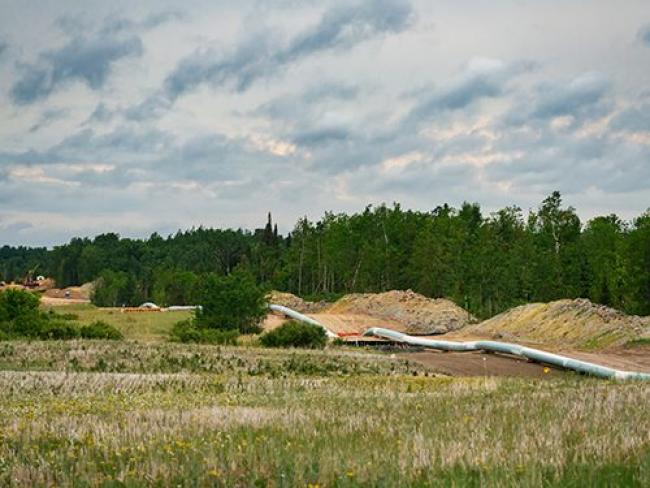Articles Menu

Aug. 9, 2023
Officials with Calgary-based pipeliner Enbridge Energy and the Minnesota Department of Natural Resources confirmed to the Minneapolis Star Tribune that the breach occurred near Moose Lake in Aitkin County, The Associated Press reports. Officials said Enbridge was working to fix the rupture, in which the layer of earth above an aquifer was punctured, causing the water to leak to the surface and possibly introducing pollutants.
It’s the fourth confirmed breach along the Line 3 pipeline route, which started operating in the fall of 2021 amid fierce opposition from environmental activists and Native American tribes. Last October, state regulators announced that Enbridge would pay more than US$11 million for water quality violations and the three previous aquifer breaches.
An aquifer is a natural underground reserve of fresh water capable of being tapped by wells. Environmentalists say such groundwater reserves face a multitude of threats from human populations, including depletion from overuse, pollution from agriculture and septic systems, and contamination from pipeline construction and spills.
Groundwater at the Moose Lake breach was flowing to the surface at about 10 to 15 gallons per minute, department officials said July 28. That was “considerably lower” than the rate at which groundwater initially flowed from the other three breaks, the agency said.
Enbridge was to submit a plan to correct the Moose Lake area damage and implement it when it received approval, company spokeswoman Juli Kellner said in a statement. The aquifer breaches don’t involve the pipe itself, she added; it stems from a sheet metal piling driven into the ground used to reinforce the trenches that crews work in.
While Enbridge scrambles to fix the latest problem with the brand new Line 3, it’s also fighting hard to continue operating its “old, deteriorating” Line 5 pipeline, after a U.S. federal judge ordered it to close a key section of the line by June, 2026, write Michelle Woodhouse of Environmental Defence Canada and Beth Wallace of the U.S. National Wildlife Federation in an opinion piece for the Toronto Star.
“We can thrive without Line 5, but we cannot survive without the Great Lakes,” they state.
The judge’s order shutting down the section of the pipeline that runs through the territory of the Bad River Band of the Lake Superior Chippewas “is an important step toward a permanent and complete closure of the pipeline,” Woodhouse and Wallace say. “Enbridge has attempted to downplay the risk of a pipeline rupture, but there are recent examples of near-misses in the Straits of Mackinac, such as when Line 5 was struck by a 12,000-lb anchor in 2018.”
More recently, “spring flooding events have caused severe erosion along the Medicine River in Wisconsin, bringing the pipeline dangerously close to open water and potential strikes from fast-moving debris,” the two authors add. “Last year, Enbridge claimed it would be years before this kind of erosion happened, but seven months later, tribal experts have drone footage showing the exact scenario they warned the court about has become reality.”
While Enbridge maintains local fossil fuel supplies will be at risk if the pipeline closes, Woodhouse and Wallace say the nearby Line 78 pipeline could fill that need with minor retrofits. The majority of the 650,000 barrels per day now travelling through the two pipelines to Sarnia, Ontario “could be transported by Line 78, with just one to two rail trains a day and/or less than one marine tanker a day, on routes already moving crude oil.”
After years of delays, distractions, and false solutions, they conclude, “there are no valid excuses not to act in the best interest of the Great Lakes and the millions of people who rely on them” by shutting down Line 5.
The main body of this report was first published by The Associated Press and republished by The Canadian Press on July 28, 2023
[Top photo: Tony Webster/Flickr]